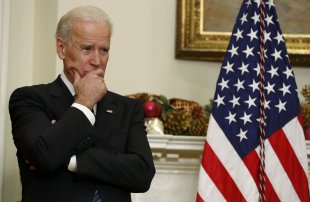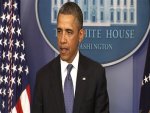Biden, McConnell pursue deal just hours before ‘fiscal cliff’
By Olivier Knox, Yahoo! News | The Ticket – 2 hrs 42 mins ago
Merry Cliffmas Eve?
Vice President Joe Biden and Republican Senate Minority Leader Mitch McConnell on Monday pursued behind-closed-doors efforts to avoid the “fiscal cliff” with just hours to halt painful automatic income tax hikes from biting into American paychecks.
McConnell announced on Sunday that he had reached out to Biden to help “jump-start” stalled negotiations with Democratic Senate Majority Leader Harry Reid. The two veteran Washington deal-makers spoke at 12:45 a.m. and again at 6:30 a.m., a McConnell aide said.
“The Leader and the VP continued their discussion late into the evening and will continue to work toward a solution,” McConnell spokesman Don Stewart told reporters by email on Monday, promising “more information as it becomes available.”
Senate Majority Leader Harry Reid sounded a cautious note Monday morning while noting the urgency of the situation.
“We really are running out of time,” Reid said shortly after 11 a.m. as lawmakers began a highly unusual New Year’s Eve session. “There are a number of issues on which the two sides are still apart, but negotiations are continuing as I speak.”
The two sides were wrangling over how to extend massive tax cuts adopted in 2001 and 2003 and expiring at midnight. President Barack Obama campaigned on letting tax rates rise on income above $200,000 for individuals and $250,000 for households, but any final deal is expected to set the threshold considerably higher.
“I hope we can keep in mind – and I know we will – that our single most-important goal is to protect middle class families,” said Reid. “Whether or not we reach an agreement in the short time we have left, we’ll need cooperation on both sides to prevent taxes from going up tomorrow for every family in America.”
But media reports that Biden and McConnell were closing in on a deal setting the threshold at $400,000 for individuals and $450,000 for families faced a liberal insurrection that could threaten the final compromise’s chances.
“No deal is better than a bad deal, and this looks like a very bad deal the way this is shaping up,” Democratic Senator Tom Harkin of Iowa said in the chamber. “So we go back to the tax system that we had under Bill Clinton. I ask: What’s so bad about that?”
Lawmakers were also battling over the estate tax paid on large inheritances. Republicans have fought to extend the current levels of what they call the “death tax” – exempting estates under $5 million and taxing transfers above that at 35%. Absent a deal, the tax will hit estates above $1 million and impose a top tax rate of 55%.
The two sides were also struggling with the so-called sequester -- $1.2 trillion in automatic cuts to domestic and defense programs over ten years. Democrats suggested Sunday that they hoped to use some of the new tax revenues to postpone some proportion of those cuts. Republicans objected, saying that only new spending cuts could be used to offset the sequester.
And there was feuding over how to spare tens of million of Americans who otherwise would find themselves paying the Alternative Minimum Tax (AMT), and over how to prevent cuts in payments to doctors who treat Medicare patients.
Any deal would need to clear both the Democratic-led Senate and the Republican-held House of Representatives. Neither looked to be an easy effort.
And it was unlikely that the compromise would spare the country another bruising partisan battle over whether and how to raise the national debt limit. Republicans have signaled that they will hold the threat of a first-ever default as leverage to win more spending cuts from the Administration. President Barack Obama has signaled that he will not negotiate on the issue the way he did in 2011, when the partisan feuding over what had typically been a routine vote in the past led to the first-ever downgrade of America’s credit rating.
EXPLORE RELATED CONTENT
1 - 4 of 20
1 - 4 of 20




No comments:
Post a Comment
Note: Only a member of this blog may post a comment.